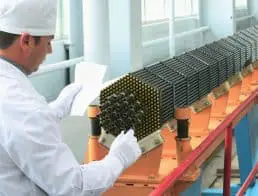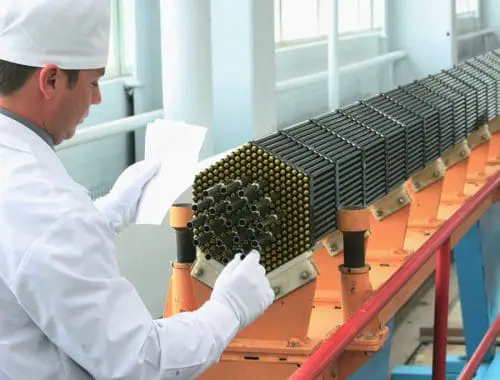Reactor engineering is a type of nuclear engineering and requires a great deal of
preparation to undertake as a career. However, when the right amount of effort is put into
becoming this type of engineer, the career can be rewarding and stimulating and can offer
numerous options for advancement. High school students who are considering this career
should maintain high scores in math and science. A bachelor’s degree is necessary to get
even an entry level position in this field; oftentimes a master’s degree is needed as well.
The degree is usually in nuclear engineering with an emphasis on reactor engineering.
However, some reactor engineers begin with a mechanical engineering or chemical
engineering degree.
The Bureau of Labor Statistics also strongly suggests that reactor engineers become
licensed through their states. After obtaining a degree, it is wise to search for an entry-
level position. Once the individual has a position in a reputable company, he or she can
advance through the levels to management if they desire. However, it does take quite a
while to train into any reactor engineering job. Training includes working with experienced
engineers in the company as well as attending on-the-job lectures and classes. This job will
include working with nuclear reactors while using computers and mathematical principles.
The engineer will also make repairs to reactors and make sure that they have the fuel that
they need. Usually these reactors are used for nuclear power. Although the preparation to
be a reactor engineer is extensive, the time spent in training is well worth it. This article
will describe some of the steps through which you should go if you want to pursue this
career.
Preparation
A student must study a number of basic subjects before delving more deeply into the
field of nuclear energy. This means taking as many courses in mathematics, physics and
chemistry as possible, even when in high school..
College and university programs
The courses described in this section were taken from those schools that were rated by U.
S. News and World Report as having the best nuclear engineering programs in the country.
The name of the institution where each course is offered is given along with its description.
Note that each has prerequisites which the candidate should check in order to plan his or
her study program.
Bachelor’s degree programs
• Course 22 (MIT). This is a set of classes that includes Fission and Fusion Energy,
Nuclear Security and Policy, and Nuclear Materials. Engineering of Nuclear Systems
(22.06), taught in the fall, is the course that relates most directly to the job of a
reactor engineer. It covers the design of a nuclear power plant using the basics of
thermodynamics, heat transfer, fluid flow and reactor physics.
• Nuclear Reactor Theory I (University of Michigan). Topics: materials used in nuclear
reactors, effects that radiation has on various materials. Fusion Reactor Technology
course is also part of the curriculum.
• Nuclear Reactor Engineering (College of Engineering, University of Wisconsin-
Madison). Generating and removing heat in and from the reactor; core thermal
design, liquid cooling, steady- and unsteady-state conduction.
Master’s degree programs
• Nuclear Reactor Dynamics (University of Wisconsin-Madison). “Basic equations and
physical parameters of point reactor kinetics without feedback effects;” also teaches
methods of synthesis.
• Nuclear Reactor Theory II, Nuclear Reactor Kinetics, Nuclear Core Design and
Analysis 1 (all available at the University of Michigan)
• Nuclear Reactor Theory, Reactor Analysis and Experimentation, Design of Nuclear
Reactors (all taught at Texas A & M University, which has one of the oldest nuclear
engineering programs in the country, dating back to 1958)
In the navy
Large numbers of reactor engineers are employed by the U. S. Navy. This job is the most
selective service in that branch of the armed forces in that of all the candidates who apply
for the program, only ten to fifteen are actually accepted in any given year. Having been
accepted, the student has to maintain a GPA of at least 3.7 out of 4. The nuclear engineer
programs through which a reactor engineer is put are the same as those for any other
nuclear option officer except that after the program has been completed, the student goes
to the Naval Reactors headquarters in Washington, D.C. instead of to a ship or a submarine.
At the Naval Reactors headquarters the engineer-in-training works in tandem with licensed
engineers in doing research and making designs for the upcoming line of reactors for
carriers and the “Silent Service” (an unofficial name given to the United States Pacific
Fleet). In addition to a high GPA, one of the requirements for a reactor engineer training
program is a degree in nuclear, electrical, mechanical or some other branch of engineering.
Duties performed by a reactor engineer
A reactor engineer has a highly skilled job which consequently pays a high salary. He or
she runs tests and monitors nuclear reactors to ensure that (1) they do not exceed the
technological specifications of the companies for which they have been made and (2) in the
event of a plant emergency, all the emergency equipment will respond the way in which
it is supposed to respond. He also makes sure that the core of the reactor is burning in
the desired manner, tracks and makes reports on whatever nuclear materials are kept
on the work site, draws up paperwork that tells the maintenance crew where to move
each container of fuel and in what order to move them, does inspections on nuclear fuel
and writes a set of procedures that govern the way everything in a nuclear power plant is
supposed to be utilized.
http://usmilitary.about.com/od/officerjo2/a/reactors_2.htm
http://www.famu.edu/cesta/main/index.cfm/naval-sciences/warfare-communities/navy/restricted-line-rl-officers/naval-reactors-nr-engineer/
http://www.ehow.com/info_8723012_salary-naval-reactors-engineer.html
http://www.wisegeek.com/how-do-i-become-a-nuclear-power-engineer.htm
https://bigfuture.collegeboard.org/careers/architecture-engineeringand-drafting-nuclear-engineers
http://education-portal.com/articles/How_to_Become_a_Nuclear_Power_Plant_Technician.html
http://myfootpath.com/career-advice-and-answers/career-interviews/nuclear-engineer-career-interview-2/
https://nationalcareersservice.direct.gov.uk/advice/planning/jobprofiles/Pages/nuclearengineer.aspx
http://haunty.hubpages.com/hub/How-to-Become-a-Nuclear-Engineer
http://work.chron.com/types-training-nuclear-engineering-20850.html








